The relationship between web scraping and proxies is like a door and a key. Without the key, you can’t easily access what’s behind the door.
Web scraping unlocks valuable data hidden across countless websites, but proxies are essential keys for safely navigating this expansive digital library. Proxies keep scrapers undetected, overcoming access limitations, IP bans, and anti-scraping defenses that would otherwise halt the flow of information.
In this guide, you’ll discover:
- Why proxies are essential for web scraping and how they help bypass challenges like IP bans, rate limits, and Captchas.
- A detailed look at the top proxy providers in 2025, including ScraperAPI, a tool that offers much more than traditional proxies.
- The different types of proxies (residential, datacenter, mobile) and when to use each for efficient, large-scale data extraction.
By the end, you’ll have a complete toolkit for reliable and anonymous web scraping, ready for any proxy-based challenges ahead.
In a hurry? Check out this quick summary:
| Proxies/Scraping Tool | Summary |
| ScraperAPI | – All-in-one solution for any scraping task – Handles tough scrapes with advanced anti-bot technologies – Great for developers and enterprise businesses – Trustpilot rating: 4.7/5 |
| Oxylabs | – Advance scraping features – Designed for large-scale scraping – Trustpilot rating: 4.3/5 |
| BrightData | – Extensive proxy management – Datasets ready for buying – Trustpilot rating: 4.6/5 |
| ProxyEmpire | – Advance bot bypass solution – Global proxy network – Trustpilot rating: 4.7/5 |
| Webshare | – Lack some advanced features – Affordable pricing – Trustpilot rating: 4.2/5 |
| Proxyrack | – Best for small to medium-scale data collection – Advanced scraping features – Trustpilot rating: 4.5/5 |
| SmartProxy | – Best for users with moderate scraping needs – Affordable pricing – Trustpilot rating: 4.5/5 |
| IPRoyal | – Easy-to-use dashboard – Lack some advanced features – Trustpilot rating: 4.6/5 |
| Soax | – Easy to use proxy management – Handle large-scale data extraction – Trustpilot rating: 4.4/5 |
| Rayobyte | – Extensive proxy pool with high customization – Suitable for large-scale scraping – Trustpilot rating: 3.8/5 |
| HomeIP | – Only provides a residential proxy – Has advanced scraping features – Trustpilot rating: Nill |
The #1 Best Web Scraping Proxy: ScraperAPI
Rating: 4.7/5
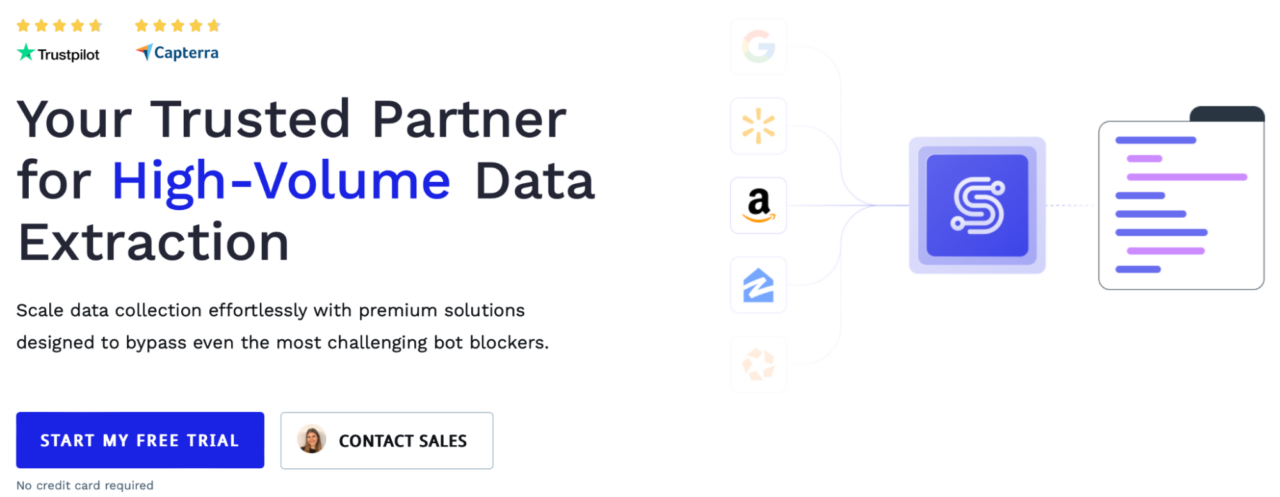
ScraperAPI is the best web scraper because it is more than just a traditional proxy provider; it’s an all-in-one web scraping solution designed to simplify and enhance the process of data extraction from websites.
Unlike typical proxies that merely mask your IP address, ScraperAPI goes further by combining IP rotation, CAPTCHA handling, and advanced anti-bot bypassing into one powerful tool. This makes it an ideal choice for users seeking a highly efficient way to scrape data from even the most challenging websites, e.g., Amazon, Reddit, etc.
One standout feature of ScraperAPI is its ability to handle large-scale scraping tasks. With an extensive proxy pool of over 150 million IPs, including residential, datacenter, and mobile IPs, it allows you to scrape the internet with unparalleled flexibility. Each request you make is automatically rotated across its IP pool, reducing the chance of bans and ensuring a high success rate in extracting data without interruptions. It’s a solution built for modern web scraping needs, especially on websites with strict anti-bot measures and rate limits that would typically block other scraping efforts.
With ScraperAPI, you don’t need multiple services to handle complex scraping tasks. Its all-in-one API provides seamless access to IP management, user-agent control, and CAPTCHA handling, removing technical barriers and enabling a more efficient data extraction process.
For anyone serious about web scraping, ScraperAPI is an invaluable asset. Starting at just $49 per month, it combines advanced proxy technology with smart automation and anti-bot bypassing, offering a streamlined solution for data extraction.
Key features
- Intelligent proxy and header rotation
- JavaScript rendering and rendering instructions
- Built-in scheduling features with DataPipeline
- Async Scraper for handling large request volumes
- Structured data endpoints for popular sites
- Geotargeting for all locations
- Advanced CAPTCHA handling
- Dedicated account manager and support Slack channels
Pros and Cons
| Pros | Cons |
| Very easy to use | US and UK only geotargeting for smaller plans |
| One-stop tool for all web scraping tasks | Some limitations with free-tier plans (number of API credits) |
| Endpoints to interact with headless browsers, collect SERP data, ecommerce data, and more. | |
| Structured endpoint to collect clean datasets and reduce manual work. | |
| Scheduling capabilities for recurring data scraping tasks | |
| Async scraper to handle large requests asynchronously | |
| Affordable and transparent pricing |
Pricing
With all the amazing features ScraperAPI offers, it remains very affordable, especially as a complete web scraping solution. ScraperAPI’s pricing structure is based on API credits and only charges per successful request, meaning your API credit won’t be deducted if your request fails [This shows how reliable ScraperAPI is!].
ScraperAPI has a free plan and 4 major plans. The free 7-day trial comes with 5,000 API credits, which is equivalent to 1,000 successful requests sent to ecommerce websites like Amazon.
The number of API credits charged depends on the domain you’re scraping, reflecting ScraperAPI’s commitment to transparent pricing and making it easy to calculate how many pages you can scrape per plan. Read ScraperAPI’s API credit breakdown.
Here is a breakdown of the ScraperAPI plan
| Plan | Pricing/Month | API Credits | Concurrent Thread | Geotargeting |
| Free Trial | Free | 5,000 | 20 | US & EU |
| Hobby | $49 | 100,000 | 20 | US & EU |
| Startup | $149 | 1,000,000 | 50 | US & EU |
| Business | $299 | 3,000,000 | 100 | World Wide |
| Enterprise | Custom | 3,000,000+ | 100+ | World Wide |
Note: You get a 10% discount when you pay yearly for each plan.
10 Other Web Scraping Proxies To Consider
2. Oxylabs [Enterprise-Grade Proxy Network]

Oxylabs is a premium proxy provider designed for large-scale web scraping and data collection. With over 102 million residential and mobile IPs, Oxylabs combines scalability with transparency, making it a trusted choice by developers and businesses for complex scraping needs. Oxylabs charges per GB starting at $99+ per month for its residential proxies.
Key Features
- Extensive proxy pool
- Geolocation targeting
- Advanced anti-bot solutions
- Dedicated datacenter proxies
- Real-time crawler
- Enterprise support
Pros and Cons
| Pros | Cons |
| Extensive proxy network | High Cost (may be too expensive for small businesses or individuals with a limited budget) |
| Advanced tools to bypass CAPTCHAs and other scraping defenses | Advanced features have a steeper learning curve for beginners |
| Precise location targeting for specific regions or cities | |
| 24/7 assistance and customized solutions for large-scale needs |
Pricing
Oxylabs charges per GB or IP, depending on your chosen proxy type. ScraperAPI, on the other hand, charges per successful request and has a detailed breakdown of how many pages a plan can get you, unlike Oxylabs. ScraperAPI offers more features and enables you to reach your goal at a cheaper rate.
For example, at $299 per month, Oxylabs offers you 124,800 JS-rendered results, while ScraperAPI offers 600,000 JS-rendered results for the same price. This is just a glimpse of how affordable ScraperAPI is. For a more detailed comparison, check our comparison between ScraperAPI and Oxylabs.
Here is a breakdown of the Oxylabs plan:
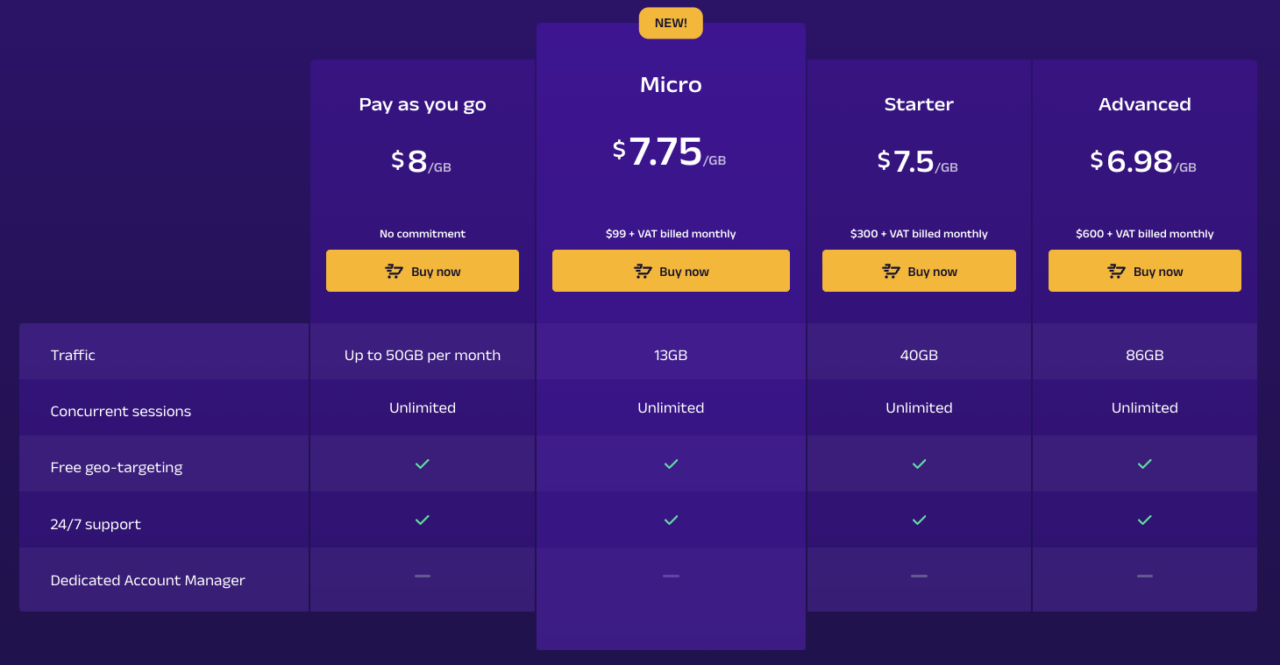
Note: You’ll need to multiply the cost per GB by the traffic included to determine the plan’s cost. For example, the Micro plan costs $100,75 per month. But this is only for access to their proxy pool and not any other feature.
3. BrightData [Good for advanced data collection]
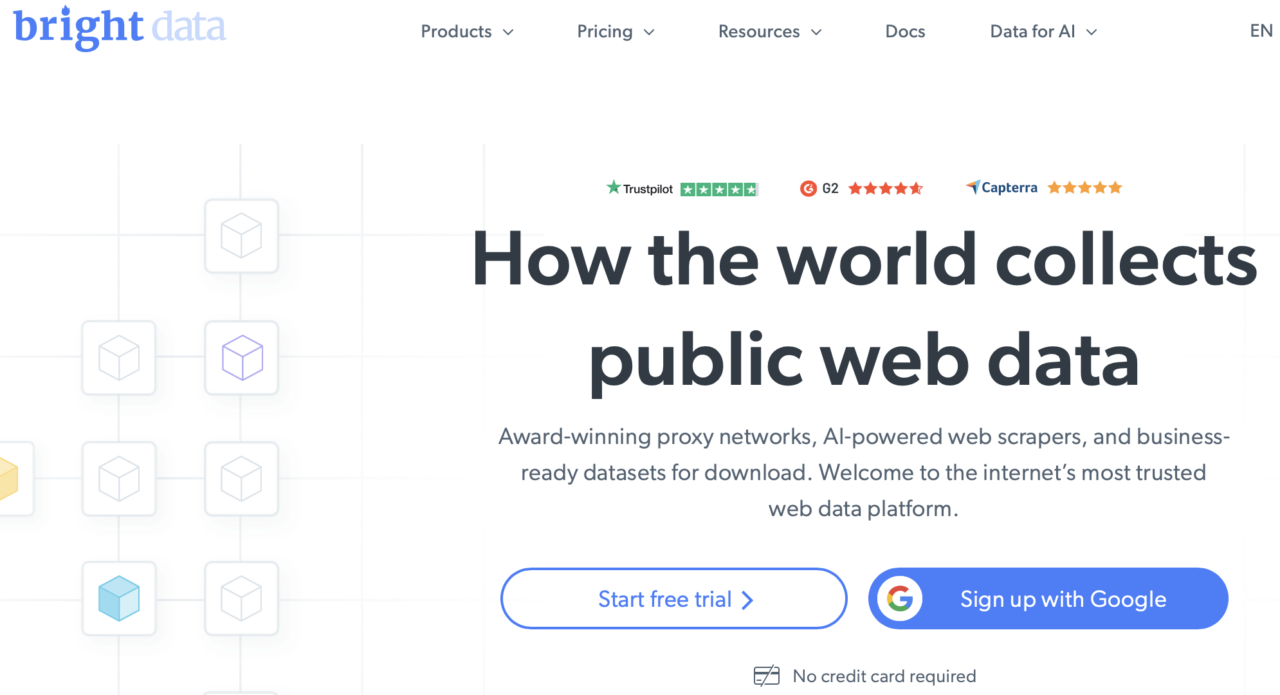
BrightData is a top-tier proxy provider offering over 72 million residential, datacenter, and mobile IPs, making it ideal for large-scale and precise data collection. Starting at $499 per month, it gives you exceptional value with its reliability and advanced features.
Key features
- Extensive proxy network
- Customizable proxy management
- Advanced anti-bot solutions
- Browser extension support
- Ready-to-buy datasets
- 24/7 Customer Support
Pros and Cons
| Pros | Cons |
| Reliable residential IPs | High cost |
| SOCKS5 Protocol | Complex for beginners |
| Real-time network status page |
Pricing
BrightData is known for its high prices, starting at $499 monthly for most plans, which is not considered cost-effective for small businesses. Even if you’re able to pay these prices, when compared to ScraperAPI, it doesn’t make business sense, as you’d get way more data for the same prices with ScraperAPI.
For a more detailed comparison, check our comparison between ScraperAPI and BrightData.
Here is a breakdown of BrightData’s residential proxy plans:
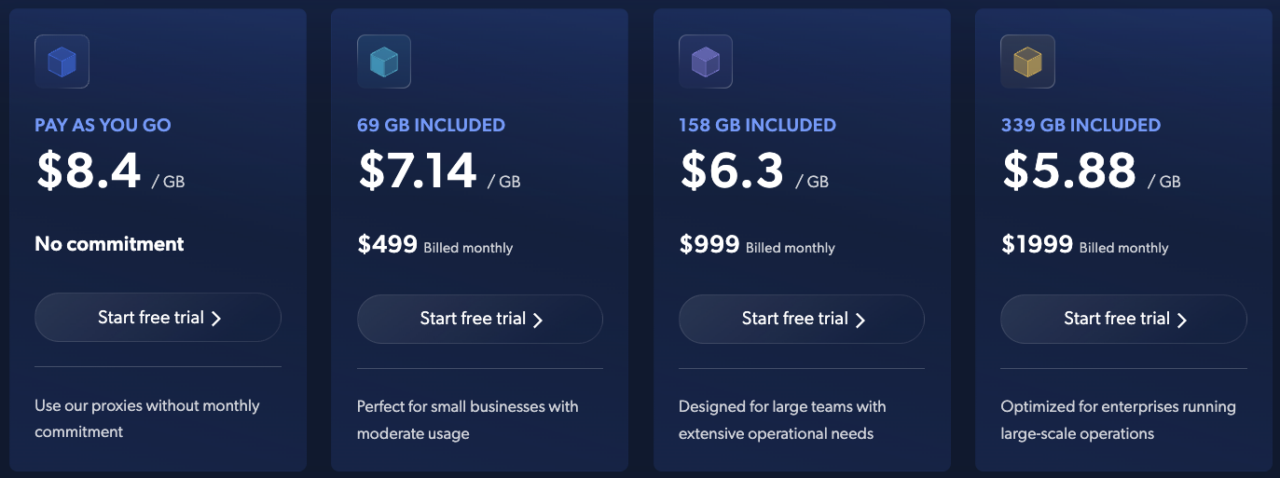
4. ProxyEmpire [Large Proxy Pool]
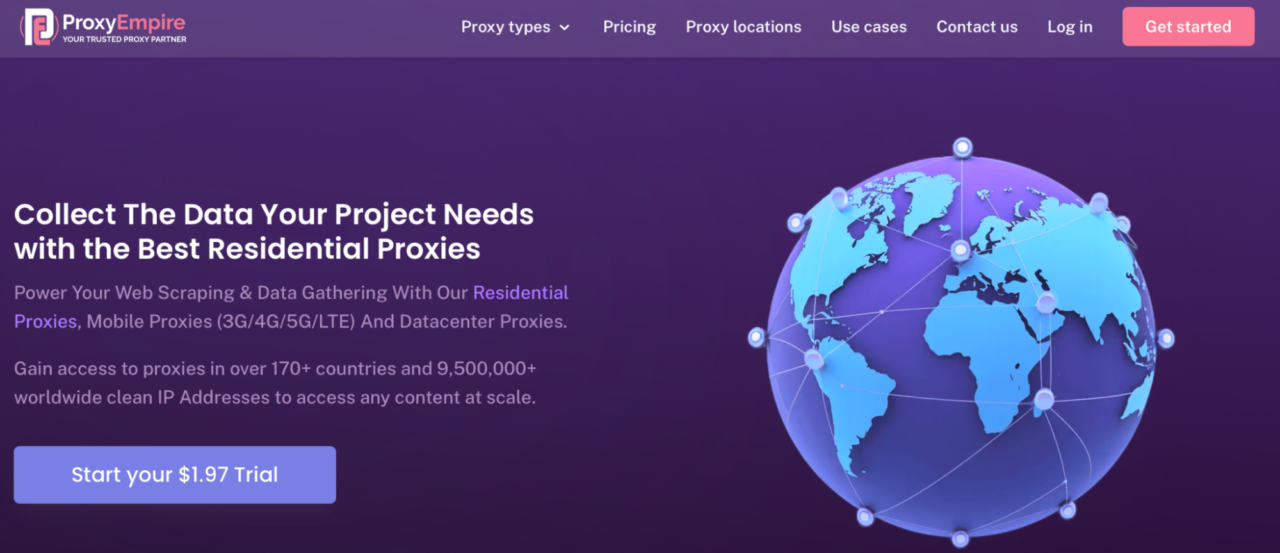
ProxyEmpire is a proxy provider offering a global network of residential and mobile IPs, ideal for geo-targeted data extraction and accessing region-restricted content. Its reliability and strong customer support make it a dependable choice for tasks like web scraping, SEO tracking, and competitive analysis.
Features
- Global Proxy Network
- Advanced IP Rotation
- Session Control
- Advanced Anti-Bot Solutions
Pros and Cons
| Pros | Cons |
| Large proxy pool | Dependent on use case |
| Geo-Targeting | No Free Trial |
| IP rotation and session control | |
| 24/7 Support |
Pricing
ProxyEmpire offers a flexible pricing model that allows users to purchase proxies based on bandwidth. However, it is more expensive compared to ScraperAPI and other competitors, with plans starting at $45 for 5GB, and there is no detailed breakdown of what each plan or GB gets you in terms of the number of pages scraped.
At $49/month, ScraperAPI is better at handling complex, dynamic content with automatic retries and machine-learning-based IP rotation, which ProxyEmpire lacks. ScraperAPI also automates CAPTCHA handling, making it a better option for extracting data.
Here is a breakdown of the ProxyEmpire plan.
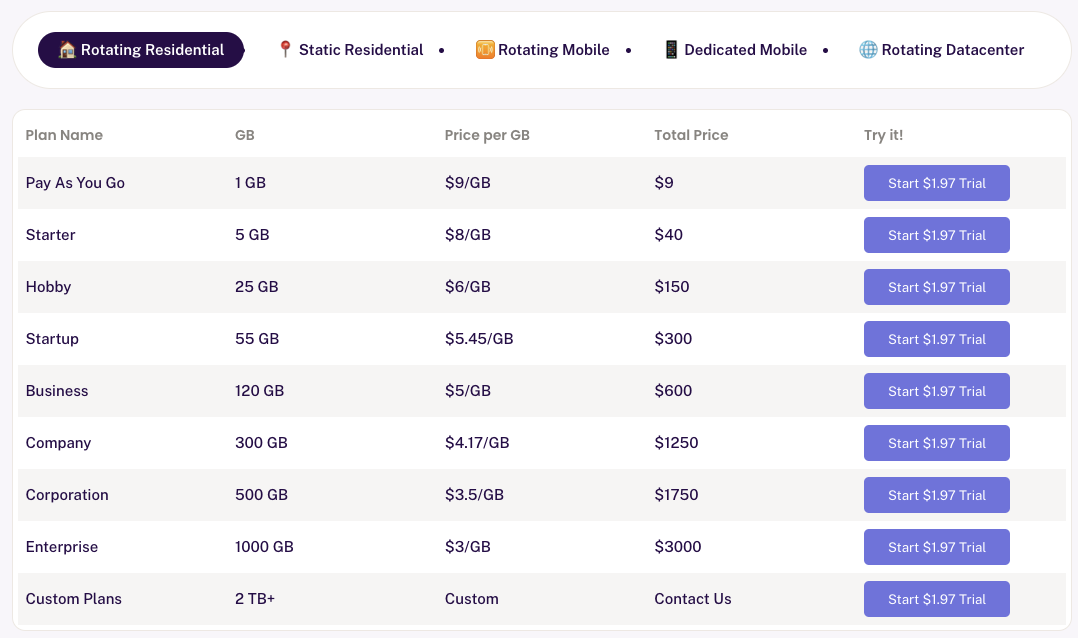
5. WEBSHARE [Affordable proxy solutions with reliable performance]
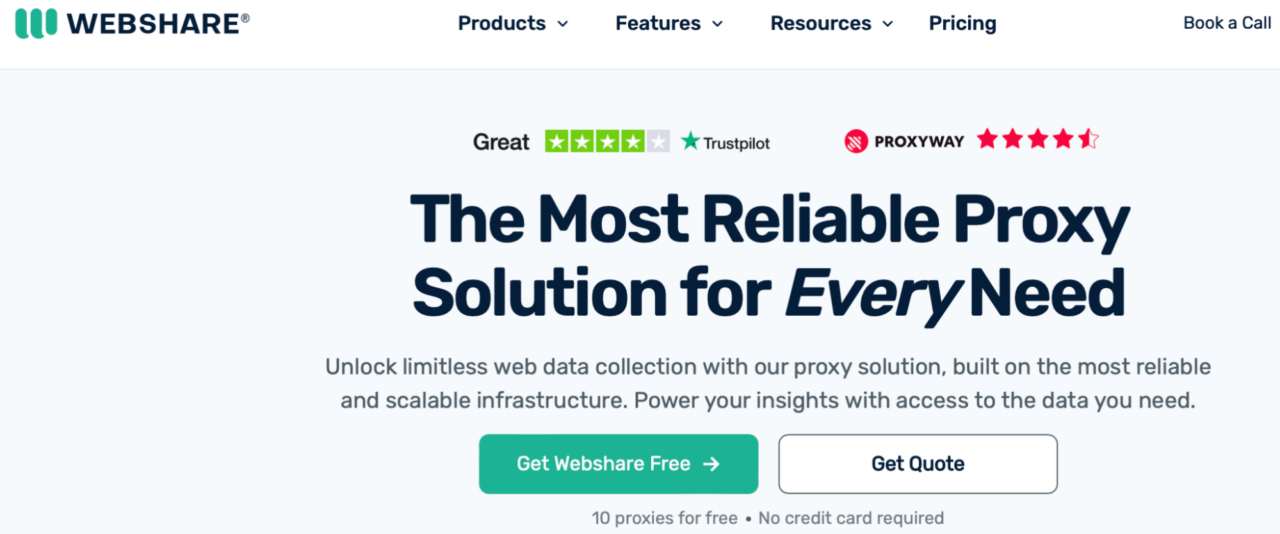
Webshare is a budget-friendly proxy provider offering residential, datacenter, and mobile IPs ideal for small to medium-scale web scraping projects. With plans starting at just $7 per month for its residential proxy, it provides reliable and easy-to-use proxy solutions, making it accessible for beginners and cost-conscious users. While it may lack the advanced features of premium providers, Webshare delivers excellent value for its price.
Key features
- Affordable plans
- Chrome extension
- Socks5 proxy
- Global coverage
Pros and Cons
| Pros | Cons |
| User-Friendly dashboard | No automatic proxy rotation |
| Affordable Pricing | Limited proxy pool |
| No advance features |
Pricing
Webshare is one of the most affordable proxy server providers on this list, offering free access to 10 proxies for testing. For larger data collection needs, their pricing scales up but remains competitively low compared to other providers, making Webshare a standout option for budget-conscious users who don’t require the advanced features of more expensive competitors.
Although Webshare is cheaper, ScraperAPI provides more advanced features like machine-learning IP rotation and better handling of complex content, whereas Webshare is more basic and better suited for lightweight tasks.
Here is a breakdown of the Webshare plan.
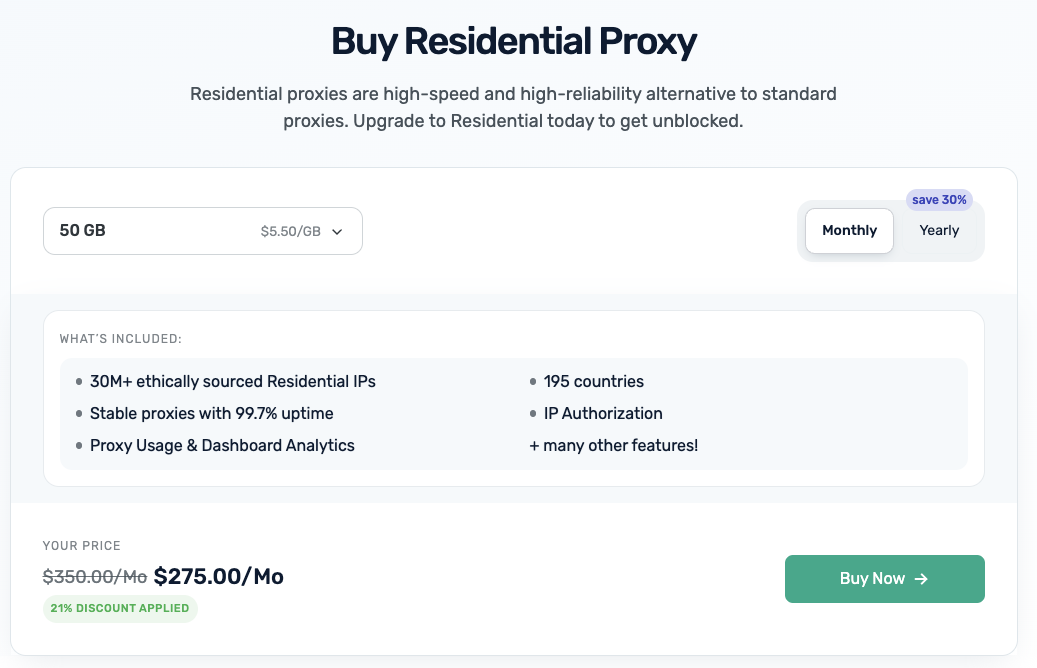
6. Proxyrack [Easy-to-use proxy service for small to medium-scale data collection]
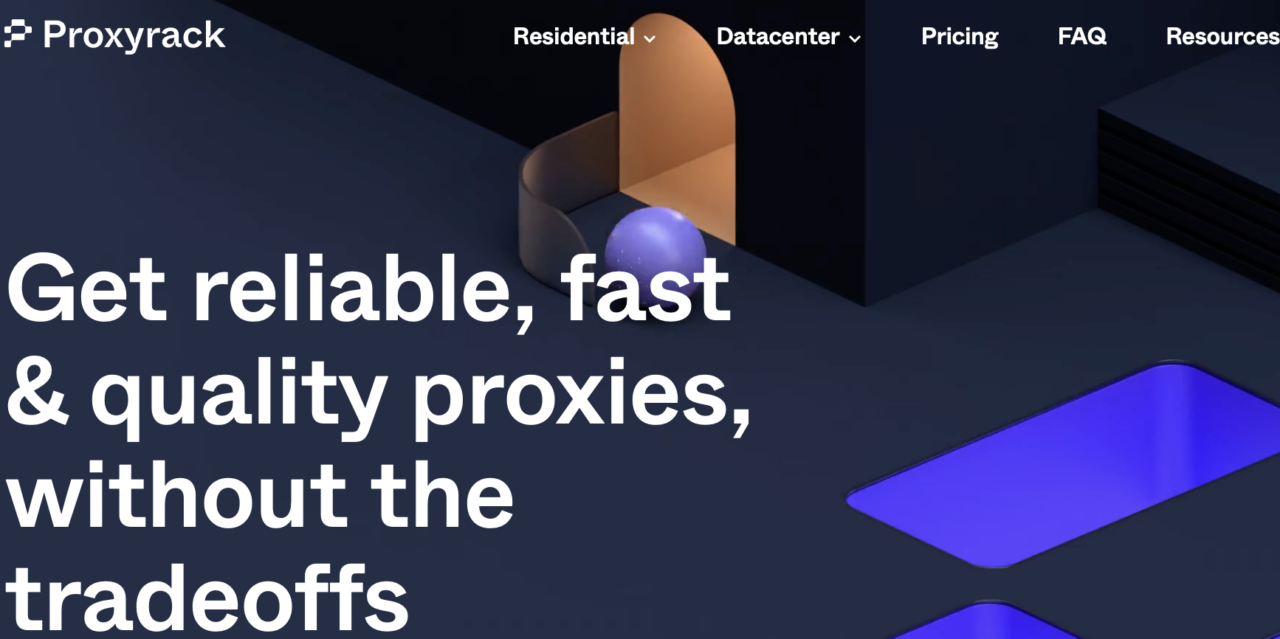
Proxyrack is an affordable and reliable proxy provider ideal for both individuals and businesses looking for high-speed data collection. Proxyrack stands out for its simple pricing model, starting at $45 per month, making it an accessible choice for smaller-scale web scraping needs.
Features
- Residential, datacenter Proxies
- Multiple locations
- HTTP, SOCKS 5 & UDP
- Rotating and static proxies
Pros and Cons
| Pros | Cons |
| Fair pricing | No CAPTCHA and advanced anti-bot protection |
| Easy to use | Smaller proxy pool |
| Unlimited bandwidth | |
| Geo-targeting |
Pricing
ProxyRack has affordable and transparent pricing, but compared to ScraperAPI, it might be considered expensive due to its limited features. It is estimated to scrape 10,000 pages for over $240, while ScaperAPI can scrape up to $100,000 pages easily at just $49. Here is what the price plan looks like per month.
Here is a breakdown of the ProxyRack plan.
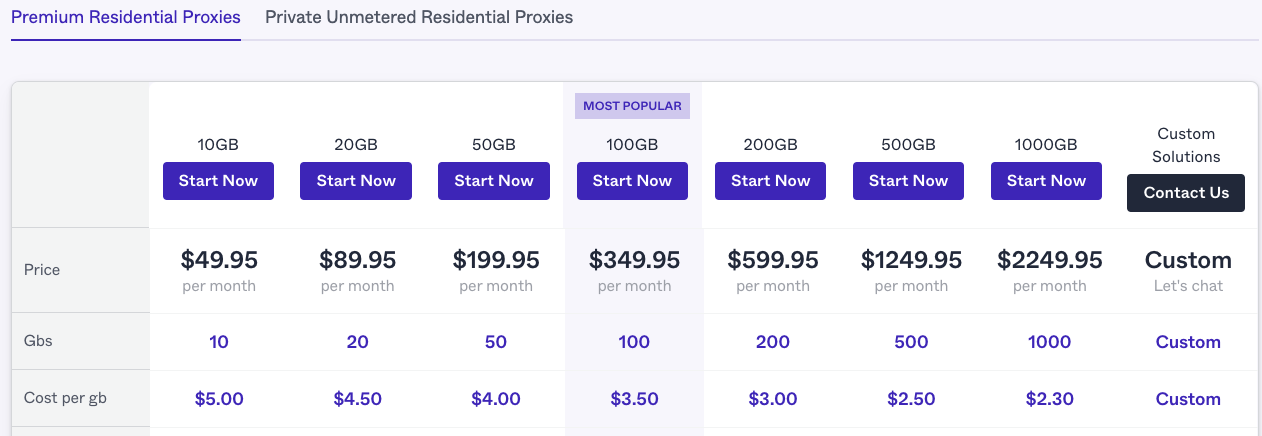
7. SmartProxy [Best for users with moderate scraping needs]

SmartProxy offers a cost-effective solution for businesses and individuals needing reliable proxies. With a pool of over 60 million IPs, it is designed for users of all skill levels, SmartProxy provides intuitive tools, making it ideal for tasks like e-commerce scraping, social media management, and SEO audits. It has affordable pricing plans with its residential starting at $12+ monthly.
Key Features
- Multiple proxy type
- Country, state, city ASN & ZIP code targeting
- Anti-bot solution
- Pre-built APIs
- HTTPS & SOCKS5 support
- Flexible rotation options
Pros and Cons
| Pros | Cons |
| User-Friendly Dashboard | Targeting by Zip code is only available in the USA. |
| Free 24/7 tech support | Limited Enterprise Features |
| Unlimited threads & concurrent sessions | No Free Trial |
| Bandwidth limit |
Pricing
SmartProxy is suitable for small businesses and individuals with limited budgets. However, at $49 per month, ScraperAPI handles complexities like CAPTCHA handling and IP rotation within its API.
On the other hand, SmartProxy offers flexibility to configure these settings but requires manual integration with scraping tools. This is why ScraperAPI stands out from even low-cost solutions.
Here is a breakdown of the SmartProxy plan.
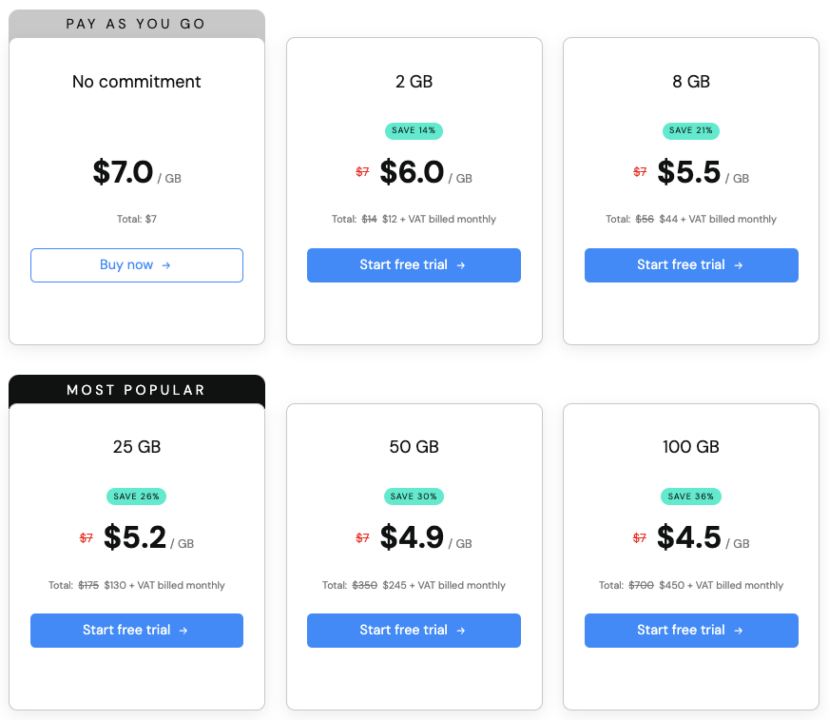
8. IPRoyal [Reliable residential proxies]
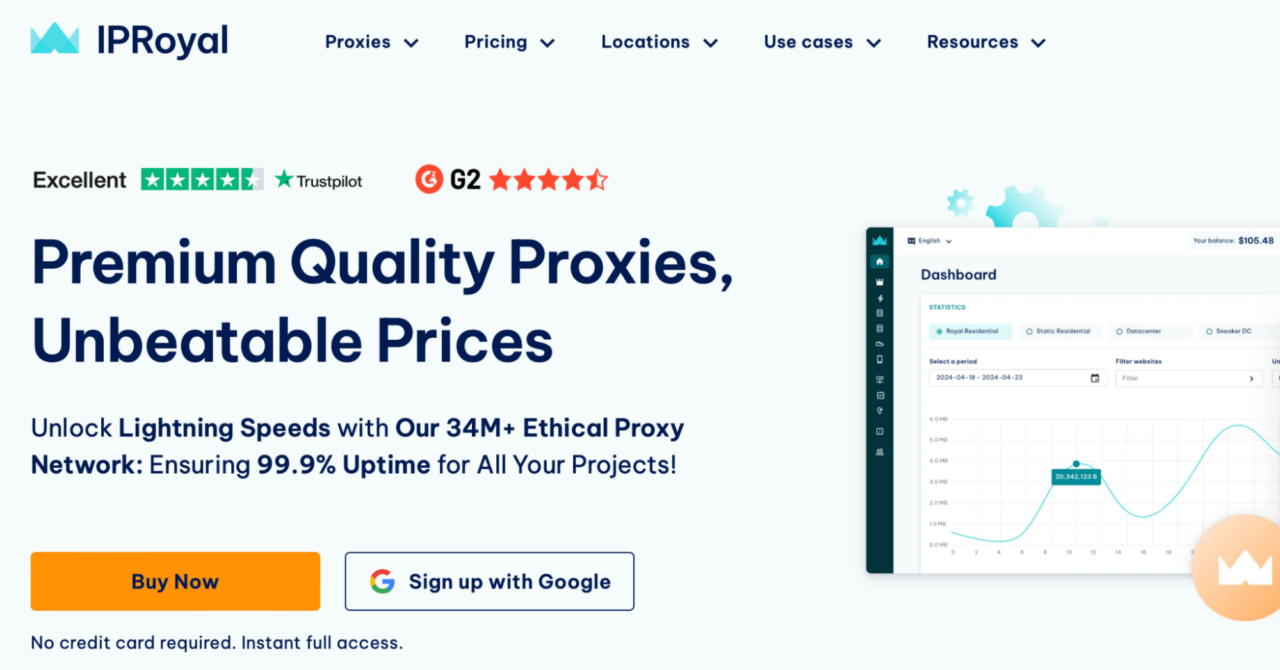
IPRoyal is an affordable proxy provider which supports residential, datacenter, and sneaker proxies, with a user-friendly dashboard for easy management. With flexible pay-as-you-go pricing, IPRoyal delivers solid value, though it may lack advanced features like CAPTCHA-solving found in premium providers.
Features
- Multiple proxy types
- Sneaker Proxies
- Geo-targeting options
- Support for HTTP(S) and SOCKS5 protocols
Pros and Cons
| Pros | Cons |
| Wide proxy variety | Can’t handle CAPTCHA |
| User-friendly dashboard | Not ideal for large-scale scraping |
| 99.7% uptime | No free trial |
| Residential proxies that don’t expire |
Pricing
IPRoyal focuses on a pay-as-you-go payment plan making it suitable for those who only want to scrape small data sets.
What makes IPRoyal different from other services is its non-expiring traffic. In other words, once you’ve bought the amount of traffic (e.g., 100GB), you can use it whenever you want. No monthly commitment is needed in most cases.
Here is a breakdown of the IPRoyal plan.
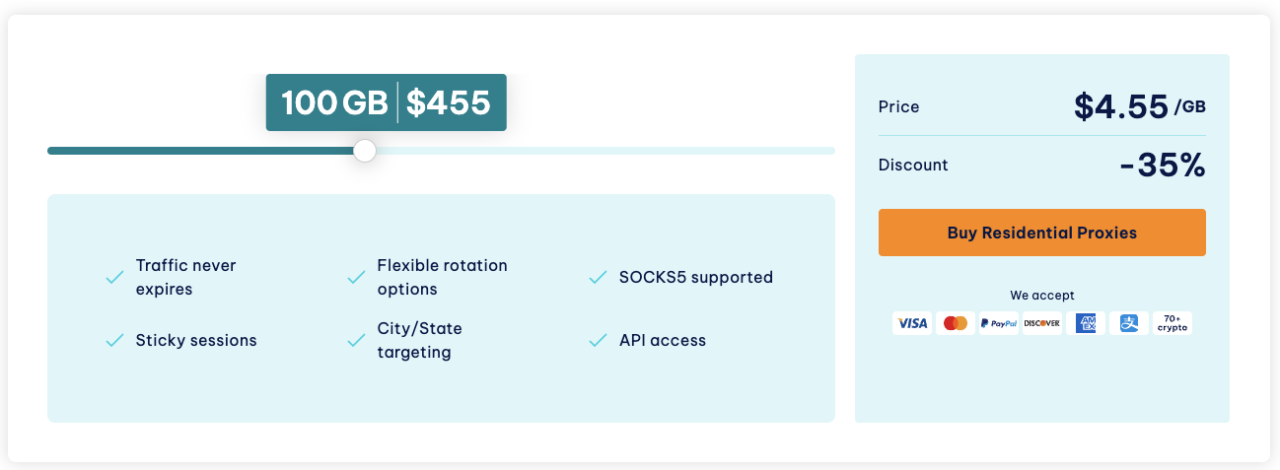
9. Soax [Flexible and clean proxy networks]
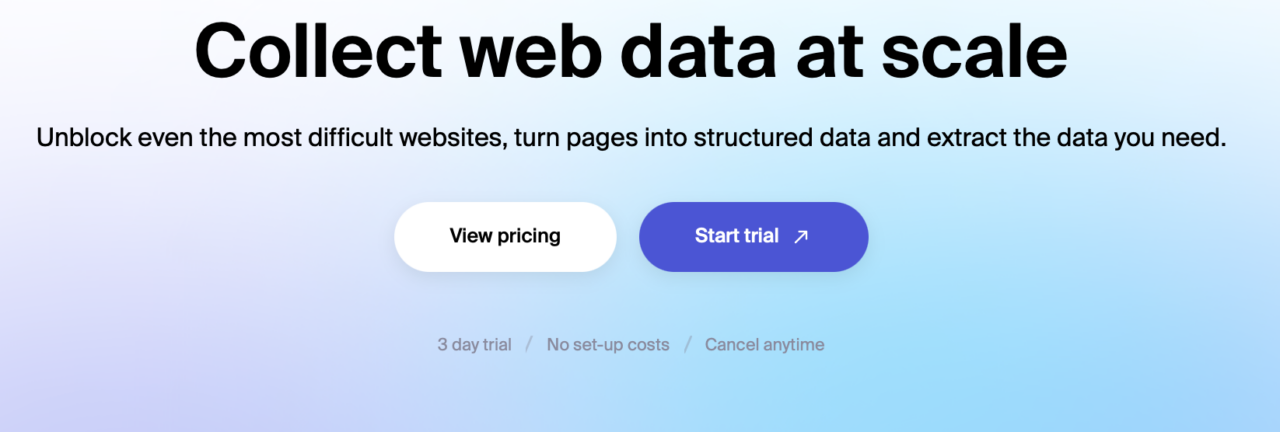
Soax is a premium proxy provider offering a clean and flexible proxy network with over 8.5 million residential, mobile, and datacenter IPs. With plans starting at $99 per month, Soax ensures high-quality proxies with rotation settings and usage reports, making it ideal for businesses and developers handling web scraping, market research, or accessing geo-restricted content.
Features
- Geo-Targeting
- Web Unblocker
- Clean Proxy Pool
- Usage Control and Reporting
- Wide use case
Pros and Cons
| Pros | Cons |
| Geo-Targeting | No Free Trial |
| User-Friendly Interface | High Starting Cost |
| Customizable Proxy Settings | Limited Bandwidth on Lower Plans |
| 24/7 Customer Support |
Pricing
SOAX uses a traffic-based pricing model, where you pay based on the amount of data you want to scrape, measured in gigabytes (GB). This model can get expensive for projects that involve downloading lots of content (like images, videos, or multimedia-rich pages).
ScraperAPI on the other hand charges per successful request and can scrape more data for you at a fraction of Soax price and It doesn’t get more expensive regardless of the content you want to scrape.
Here is a breakdown of the SOAX plan.
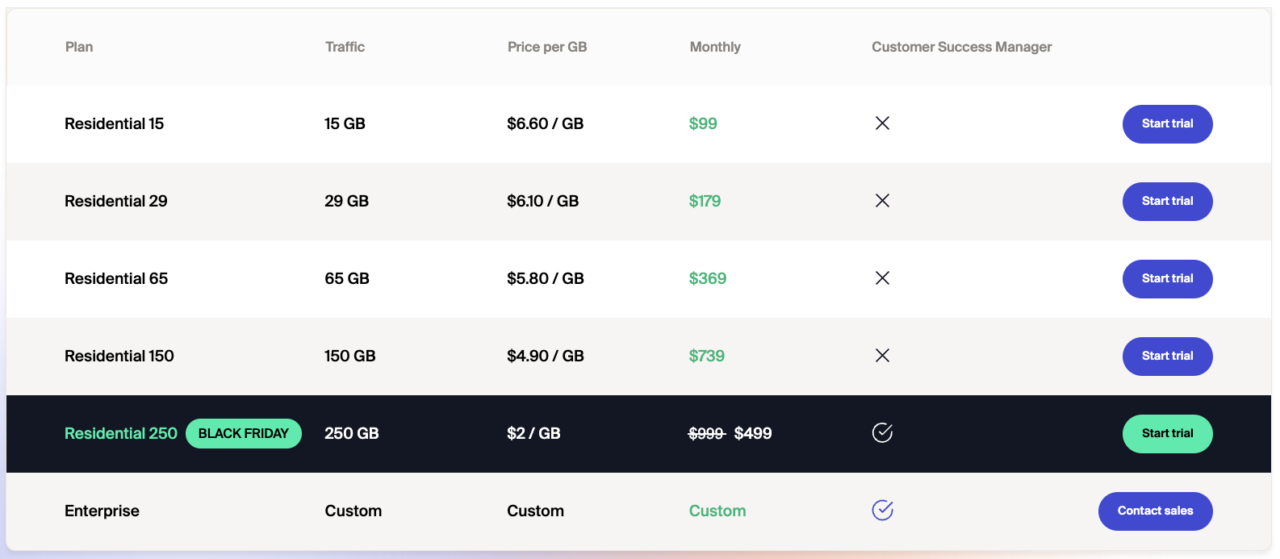
10. Rayobyte [Extensive proxy pool with high customization]
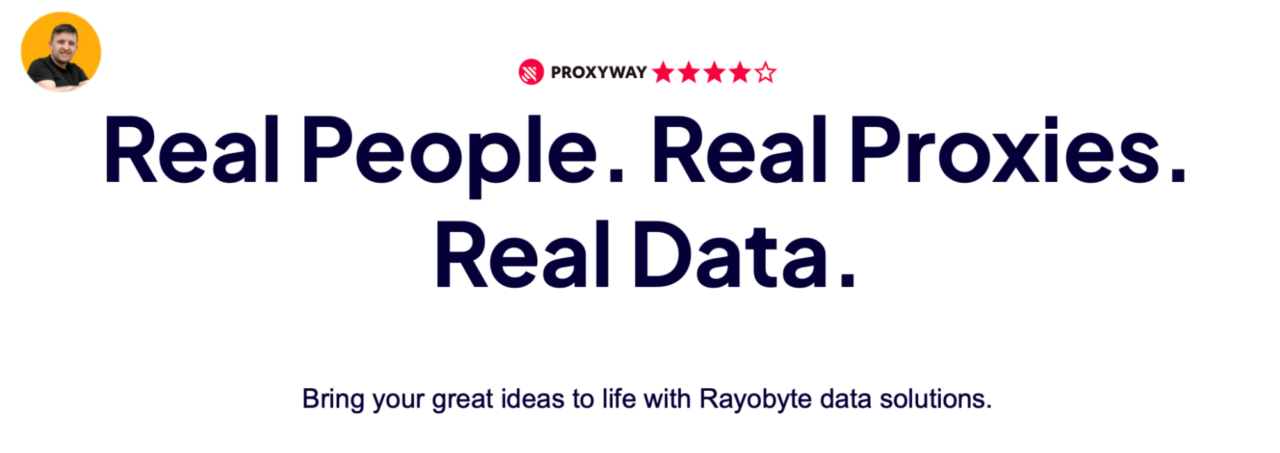
Rayobyte is a versatile proxy provider offering residential, datacenter, and ISP proxies tailored for large-scale tasks like ad verification, SEO monitoring, and price tracking. Starting at $15 per GB, it’s ideal for businesses and developers needing reliable and scalable proxy solutions, backed by 24/7 customer support.
Features
- Scalable Plans
- Global Coverage
- Customizable Configurations
- Real-Time Analytics
Pros and Cons
| Pros | Cons |
| Global coverage | Higher cost for large-scale usage |
| Scalable for businesses | Hard to use for beginners |
| Ethical practices |
Pricing
Rayobyte is priced per GB, which is usage-based and may become expensive as data requirements grow. The need for manual management of proxies and anti-bot strategies can increase operational overhead. ScraperAPI’s fixed pricing and automatic features provide a more straightforward and cost-effective solution for high-volume scraping needs.
For users who want an integrated, easy scraping experience with predictable costs, ScraperAPI is the best choice.
Here is a breakdown of the Rayobyte’s plan.
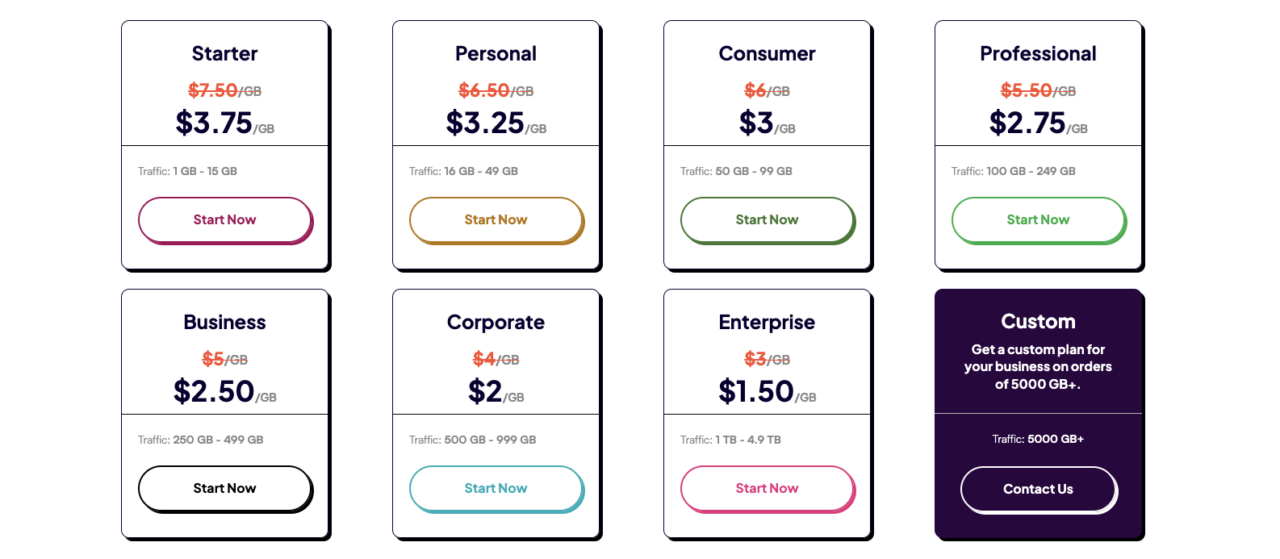
11. HomeIP [Residential Proxy Solution]

HomeIP is a residential proxy provider offering a vast pool of real IP addresses to ensure seamless web scraping, market research, and ad verification. Known for its high pricing, and 24/7 customer support, HomeIP is a reliable solution for businesses and individuals needing large-scale data collection and privacy.
Features
- Large Proxy Pool
- Session Control
- Customizable Rotation
- Unlimited Connections and IP Rotation
Pros and Cons
| Pros | Cons |
| Customizable IP rotation | Complexity for beginners |
| Unlimited connections | High price |
| High anonymity and security |
Pricing
For $135 per month for 25GB, HomeIP offers features like session control and IP rotation but requires manual setup to maintain session consistency or rotate proxies. On the other hand, ScraperAPI provides a fully automated solution for just $49, including advanced features like CAPTCHA handling and anti-bot bypassing, significantly reducing user effort and ensuring easy web scraping.
ScraperAPI provides you with more proxy options, and ability to scrape more data automatically with a simple API call.
Here is a breakdown of the HomeIP’s plan:
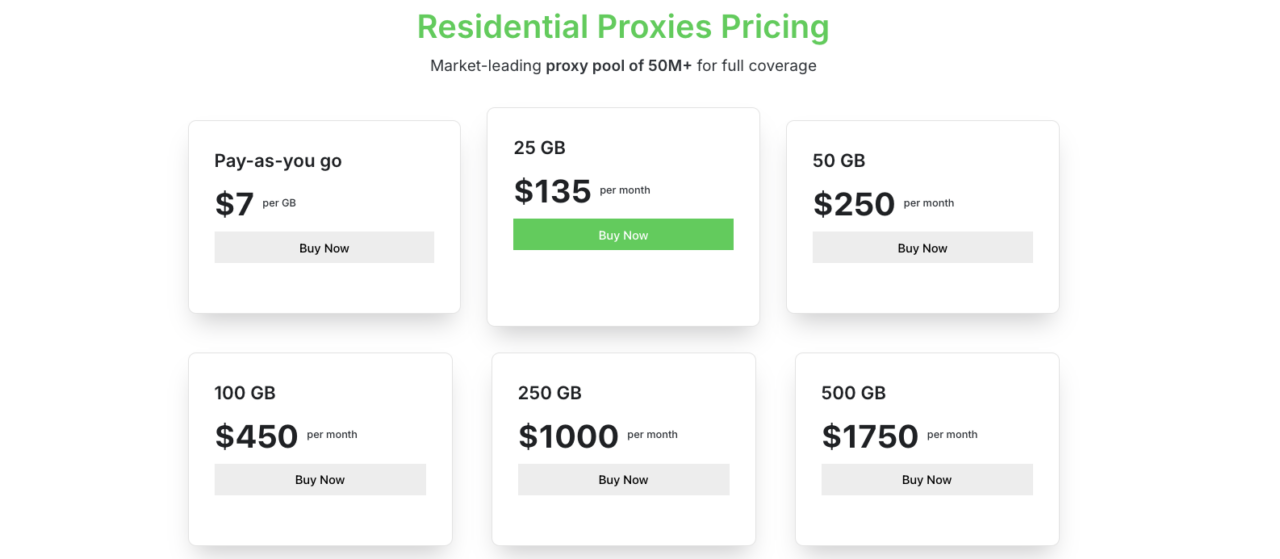
What are web scraping proxies?
Web scraping proxies are tools that help you collect data from websites without getting blocked.
They act as middlemen between your scraping tool and the target website by hiding your real IP address using a different one each time. This makes it seem like the requests come from different users rather than 1 user.
Why do you need proxies for web scraping?
Proxies are critical for web scraping because they help avoid detection and keep your scraping tasks running. Websites use various methods to spot and block scrapers, but proxies address these challenges by:
- Avoiding IP Blocking
Sending many requests from the same IP address can get you blocked. Websites track these patterns as unusual activity. Proxies rotate your IP address, making it look like the requests are coming from different users, reducing the risk of being blocked. - Bypassing Rate Limits
Some websites limit how many requests you can send from a single IP in a short time. Proxies distribute your requests across multiple IPs, helping you stay within these limits while collecting data. - Overcoming Geographical Restrictions
Websites may block or show different content based on your location. Proxies let you use IPs from specific regions, allowing you to access location-restricted data. - Handling CAPTCHA Challenges
CAPTCHAs are used to block automated bots by detecting non-human behavior. Proxies, especially when paired with CAPTCHA-solving tools, help you bypass these challenges by rotating IPs and simulating real user activity.
Websites identify scrapers through factors like high request volumes, predictable patterns, static IPs, and inconsistent geographic locations. Proxies address all these issues, making web scraping more effective and less likely to get blocked.
What are the different types of proxies for web scraping?
Datacenter Proxies
Datacenter proxies are IP addresses generated by third-party data centers rather than being tied to a physical device or an internet service provider (ISP). Datacenter proxies operate through virtual servers and are widely used for tasks requiring high-speed and anonymous internet connections.
Residential Proxies
Residential proxies are IP addresses assigned to real physical devices, such as home computers or smartphones, by internet service providers (ISPs). Residential proxies route your internet traffic through genuine devices, making it appear like your requests originate from a legitimate user in a specific location.
Mobile Proxies
Mobile Proxies are IP addresses assigned by mobile network operators to devices such as smartphones, tablets, and other portable devices. Mobile proxies are linked to real mobile devices and utilize 3G, 4G, or 5G networks, making them highly authentic and effective for bypassing strict anti-bot systems.
Public Proxies
Public Proxies are free proxy servers available to the public, often hosted by individuals or organizations and accessible without payment. Public proxies work as intermediaries, masking your IP address by routing your internet traffic through their servers. While they can provide anonymity and bypass certain restrictions, they have significant drawbacks, like:
- Unreliability, as they often experience frequent downtime, making them unsuitable for consistent use.
- Their performance is usually poor due to overcrowding, as many users share the same proxy, leading to slow response times and delays.
- They also pose serious security risks since anyone can host these servers, including malicious actors who may intercept sensitive data or inject harmful content.
Premium Proxies
Premium Proxies are high-quality, paid proxies designed to offer superior performance, reliability, and security compared to free or public proxies. Reputable proxy service providers provide these proxies and are often tailored to meet specific needs such as anonymity, speed, or access to restricted content.
Other Proxy Types include VPNs, which offer encrypted browsing and IP masking, and TOR, which anonymizes internet traffic by routing it through volunteer servers. While both are useful for privacy, they are generally less effective for web scraping compared to dedicated proxies like residential or datacenter options.
Factors to Consider When Choosing a Proxy Provider
When selecting a proxy provider for web scraping, several key factors should be considered to ensure effectiveness and reliability:
- IP Blocking Resistance: Websites can detect scraping attempts through suspicious patterns, such as too many requests from a single IP. A strong proxy provider will have features like IP rotation to help evade IP bans and avoid being blocked.
- Success Rate: A high success rate is critical, especially when dealing with sites that have advanced anti-bot measures. Proxies that offer features like automatic retries and CAPTCHA handling improve the likelihood of successful data extraction.
- Proxy Rotation: Effective proxy rotation ensures that each request appears to come from a different IP address, helping prevent detection and banning. This is crucial when scraping large amounts of data from websites that limit the frequency of requests per IP.
How to set up a proxy for web scraping
Setting up a proxy for web scraping ensures your scraper avoids detection, bypasses rate limits and maintains anonymity. With ScraperAPI, the process is streamlined, as it manages proxy rotation, geotargeting, and CAPTCHA handling for you.
To configure your web scraper with ScraperAPI, you simply route your HTTP requests through ScraperAPI’s endpoint. This involves replacing your target URL with a formatted API request URL provided by ScraperAPI. You can include optional parameters for features like:
- Proxy Rotation: Automatically rotate IP addresses for each request.
- Geo-targeting: Specify the region of the IPs to access region-specific content.
- Custom Headers and User-Agent Rotation: Modify headers or user-agents to mimic real browsers.
Here’s an example in Python using the requests library:
import requests
# ScraperAPI endpoint
api_key = "YOUR_API_KEY"
target_url = "Your_Target_Website_URL"
# Make the ScraperAPI request
scraperapi_url = f"http://api.scraperapi.com?api_key={api_key}&url={target_url}"
response = requests.get(scraperapi_url)
if response.status_code == 200:
print("Scraped data:", response.text)
else:
print("Error:", response.status_code)
With this setup, ScraperAPI automatically handles proxy rotation and anti-bot bypassing, saving you the trouble of managing these manually. This approach reduces the risk of detection and improves the success rate of your scraping tasks.
For a detailed guide, including a tutorial on using ScraperAPI with Python, check out this article where I used ScraperAPI with Python to scrape Reddit comments. It explains the setup process step-by-step, from API integration to handling proxy rotation effectively.
The legality of web proxies depends on their use and local laws. They are legal for purposes like enhancing privacy or bypassing regional restrictions but can be illegal if used for malicious activities like hacking or fraud. While using proxies for web scraping is typically not unlawful, it might breach website terms of service, potentially leading to civil consequences. Always ensure compliance with relevant laws and terms of service when using proxies.
Here’s an in-depth guide on web scraping legalities.
Using free proxies for web scraping is possible but generally not recommended. Free proxies often lack reliability, speed, and security. They typically have limited bandwidth, higher chances of being blocked due to overuse, and can expose users to privacy risks, as they might be poorly managed or malicious.
For effective and scalable web scraping, paid proxies, like residential or datacenter proxies, are preferred since they offer better reliability, proxy rotation, and anonymity.
When deciding between a VPN and a proxy for web scraping, proxies are generally the better choice. Here’s why:
Proxies are specifically designed for tasks like web scraping. They allow for better IP rotation, higher success rates, and seamless scalability. Options like residential, datacenter, and mobile proxies offer tailored solutions for bypassing restrictions and avoiding detection.
VPNs, while excellent for encrypting data and securing online activities, are not optimized for web scraping. They use fewer IPs, lack rotation capabilities, and can trigger blocks when used for high-volume or automated scraping tasks.
The best type of proxies for web scraping depends on your specific needs, but residential proxies are generally considered the most effective due to their high reliability and low detectability.
Avoiding blocks while web scraping with a proxy requires careful planning and proper techniques. Here are key strategies:
Use rotating proxies
Limit request rates
Respect robots.txt
Solve CAPTCHAs effectively
Use high-quality proxies like ScraperAPI
Proxies work with different IP protocol versions—IPv4 and IPv6—by acting as intermediaries between the client and the internet, ensuring requests are forwarded and responses are relayed appropriately.